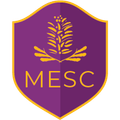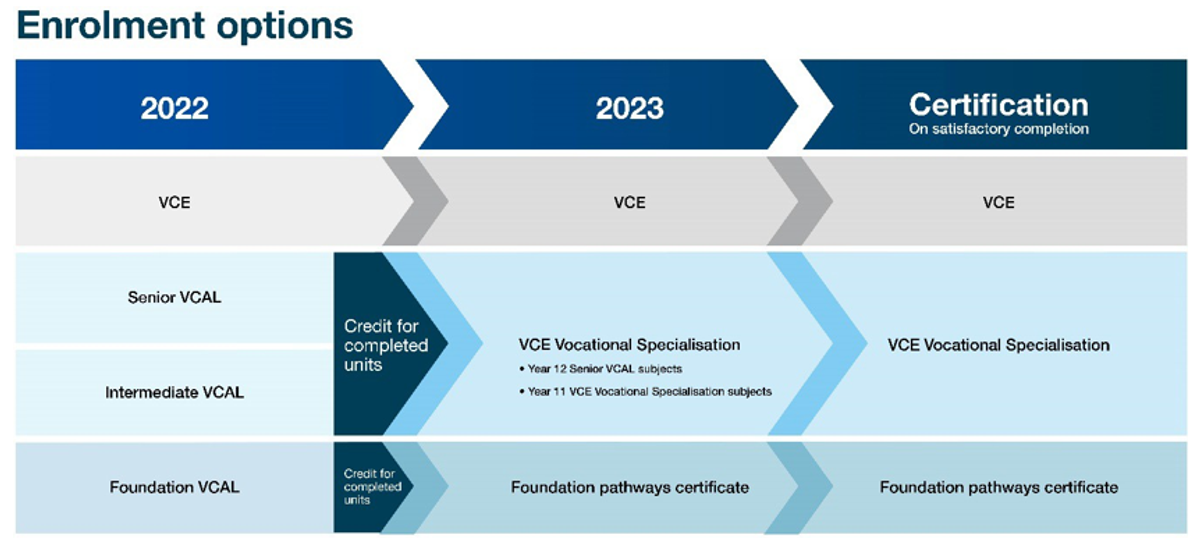VCE VM & VCAL Studies

VCE VM & VCAL Studies
Victorian Certificate of Applied Learning (VCAL)
Note: Only applicable to current students entering into Senior VCAL
We are supporting all students in their course selections for 2023 and are providing the following advice and information to students considering a VCAL pathway.
If students are studying Intermediate VCAL in 2022 they will transfer into the VCE Vocational Major with credit for completed VCAL subjects in 2022. In 2023, students will continue to study Senior VCAL subjects in the new certificate as part of the implementation process. At the end of 2023, these students will be awarded the VCE Vocational Specialisation if they meet the requirements.
Students who are studying Foundation VCAL over multiple years, including in 2022, may transfer into the new foundation pathways certificate in 2023 or the VCE VM with credit for completed subjects.
This approach provides assurance and clarity to current Year 10 students some of whom will be among the first cohort to receive a VCE Vocational Major certificate.
The following diagram sets out the senior secondary pathways for students commencing the VCE or VCAL in 2022.
Note: Students can also move between certificates
VCAL is studied under five compulsory strands:
- Strand 1 - Literacy Skills
- Strand 2 - NumeracySkills
- Strand 3 - Industry Specific skills; Vocational Education and Training (VET) and School Based Apprenticeship & Traineeship (SBAT)
- Strand 4 - Work Related Skills are undertaken through participation in a school based course.
- Strand 5 - Personal Development Skills require you to participate in team based student led projects thatmay be school or communitybased.
To be awarded a VCAL qualification, students must successfully complete a program that contains a minimum of 10 credits. A credit is gained for successful completion of a unit of study. A unit of study can be:
- one VCAL unit
- one VCE unit
- 90 hours of completed VET modules or units of competence and/or FE modules.
It is compulsory at the Intermediate and Senior levels that students complete an accredited VET unit to meet the Industry Specific skills strand. At MESC we also require students at Intermediate and Senior levels to complete work experience on one of their non-school days.
Students will undertake a Unit 1 subject as a class in addition to the 5 VCAL strands above
School Based Apprenticeship & Traineeship (SBAT)
A School Based Apprenticeship & Traineeship (SBATs) allows you to work as a paid part time trainee or apprentice whilst completing your secondary education at school. The program offers you a chance to get a head start in the industry you choose whilst completing the last two or three years of your education. For further information you must see Mrs Leanne Paterson, Student Pathways & VET Coordinator.
SBAT’s are normally undertaken by VCAL students and usually satisfy the industry related skills strand. VCE students wishing to do an SBAT need to proceed with approval from Senior School Coordinators and Student Pathways & VET Coordinator – SBAT’s can contribute to VCE as a 10 % increment /block credit. Part time traineeships done outside school hours can also contribute to VCE and VCAL – students undertaking training in their part time job should bring their training plan to Mrs Leanne Paterson (Student Pathways & VET Coordinator) in order for these to be applied to your studies.
Vocational Education and Training (VET)
The Vocational Education and Training (VET) in schools program combines general VCE, VCE VM, or VCAL studies with vocational training and hands-on training and practice in the workplace. VET in schools programs are fully recognised by the VCAA and contribute to a unit 1-4 sequence OR a unit 1-2 sequence.
Successful completion of a VET in the VCE, VCE VM or VCAL program provides students with:
- two qualifications: a Victorian Certificate of Education or a Victorian Certificate of Applied Learning issued by the VCAA and a nationally recognised VET Certificate issued by a Registered Training Organisation (RTO);
- two Statements of Results issued by the VCAA giving details of units completed in the VCE or VCE VM and competencies completed in the VET qualification;
- the ability to articulate into further vocational education and training courses with, in many cases, credit being given towards an apprenticeship.
- the opportunity to have a positive effect on VCE student’s Australian Tertiary Admission Rank (ATAR) which can improve access to further education. These effects only occur if the Unit of Competencies undertaken within the certificate are the correct AQF level. In some programs this means the student will receive a Study Score in the same way they would for a traditional VCE subject. This can count as one of their top 4 subjects as contributing fully towards the ATAR. If this does not occur the student gains an increment towards their ATAR.
Students may be required to complete 40— 80 hours of Structured Workplace Learning (SWL) out of school hours, usually during the holidays.
Programs are optional, and they do involve additional costs: Full payment of VET levies must be made before enrolment is confirmed with the course providers.

